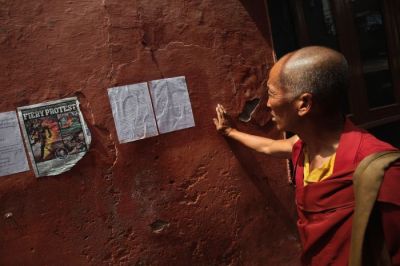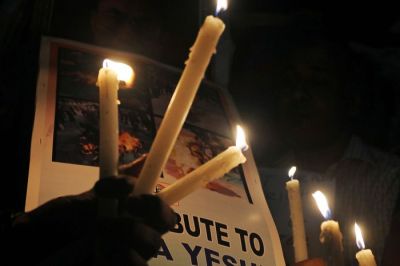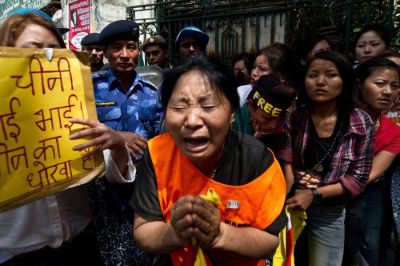 |
| Died in hospital: A Tibetan monk reads a note written by protester Jamphel Yeshi and posted on a wall in New Delhi (Reuters: Adnan Abidi) |
 |
| Exiled Tibetans and human rights activists participate in a candlelight vigil for Jamphel Yeshi (AFP: Dibyangshu Sarkar) |
 |
| A Tibetan activist takes part in the Delhi protest (AFP: Manan Vatsyayana) |
By Richard Lindell, wires
ABC News (Australia)
The death of a Tibetan protester who set himself on fire in the Indian capital New Delhi has given new impetus to protests over China’s rule in Tibet.
Jamphel Yeshi was at a rally protesting against the visit of Chinese president Hu Jintao on Monday when he doused himself with fuel and set himself alight.
He had burns to 98 per cent of his body and was declared dead at Delhi’s Ram Manohar Lohia hospital yesterday.
Photos of Mr Yeshi on fire were sent out on news wires and have been
turned into posters which have been put up in New Delhi and in
Dharamsala, the Himalayan hill town which is home to thousands of exiled
Tibetans.
At least 29 Tibetans – often monks and nuns – have died
after setting themselves on fire in protests against Chinese rule in the
past year.
At least 100 other peaceful protestors, many of them female, have
been arrested in recent days, and other Tibetan exiles living in the
Indian capital have been warned by police not to protest during today’s
summit.
“His heart stopped working, everything stopped working. He had 98 per
cent burns,” said LK Makhija, the head of the burns department which
treated Mr Yeshi.
“Normally people with 98 per cent burns do not survive. The body has been sent for a post mortem.”
Friends of Mr Yeshi said he was a quiet and bookish 27-year-old man
who had fled from China in 2006 and was living in the Tibetan exiles’
colony of Majnu ka Tila in Delhi.
He had grown increasingly frustrated at the fate of Tibetans in China, but had told no-one of his planned self-immolation protest, which made headlines around the world.
Mr Yeshi is the first self-immolation victim outside China since a
spate of similar protests inside the country began last March.
Friends of Mr Yeshi say he was tortured by Chinese authorities in Tibet before he escaped, leaving his mother behind.
“He was very dedicated to a free Tibet, he was very active in the
cause. It is a big loss for all of us and our community,” said Tsewang
Dolma, a Tibetan Youth Congress member.
“He made a big sacrifice for the Tibetan nation, for his brothers and sisters. He wanted to end the suffering in Tibet.”
The protest against Chinese rule in Tibet comes as leaders, including
Hu Jintao, arrive in New Delhi for the so-called BRICS summit of
developing and newly industrialised nations.
The Indian capital is home to thousands of Tibetans who have vowed to
use Mr Hu’s visit to focus global attention on the Chinese government’s
alleged repression in Tibet.
Some Tibetan students said police were not allowing them to leave
their hostels, while Tibetan residential areas were flooded with
security forces ahead of the summit.
“I have been locked up in my hostel with 150 other students since
yesterday,” said Paldin Sonam, a 24-year-old Tibetan activist and
student at Delhi University.
“The police said they were worried that we would try to do the same
as the man who set himself alight. They were concerned about a law and
order problem developing. We can’t leave.”
But local police refute the protesters’ claims, instead saying they
are focusing on clearing areas around the summit of the protesters.
“We are not putting Tibetans under house arrest (but) they have been instructed not to rally anywhere inside New Delhi while the summit is going on,” said police spokesman Rajan Bhagat.
“Protesters are being put into buses and removed because they have
not had permission. There is also heavy deployment in places where
Tibetans stay,” he added.
Many Tibetans in China complain of religious repression
as well as a gradual erosion of their culture, which they blame on a
growing influx of Han Chinese, the country’s dominant ethnic group.
But China rejects the charge and accuses Tibetan spiritual leader the
Dalai Lama of inciting self-immolations in a bid to split Tibet from
the rest of the nation.

No comments:
Post a Comment